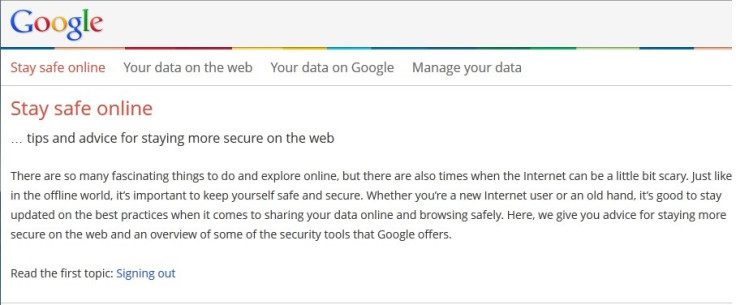Google to Launch Online Safety and Security Campaign: Good To Know

Google is launching an online security campaign alongside the Citizens Advice Bureau Monday that will highlight the importance of strong passwords and suspicious e-mails.
The campaign will be advertised throughout the world in newspapers on public transport and online, which will all point the consumer to www.google.co.uk/goodtoknow.
This will be Google's first campaign advertising something other than their own products like Google Chrome or the Android mobile operating system.
Google will be funding the project under the direct consultation of the Citizens Advice Bureau, who believe that online safety is increasingly important.
"Information is a powerful tool for preventing problems from arising in the first and safety, personal data and identity theft are among the top concerns of people of using internet," said Gillian Guy, CAB's chief executive.
Google concluded: "the Web site and advertising campaign aim to empower users to tackle their online security concerns and make more informed decisions about their internet use."
Google and the Citizens Advice Bureau's five tips for online safety:
1. Pick a strong password. One idea you can try is to choose a line from your favourite song, film or play, like "To be or not to be, that is the question". Then use numbers, symbols and letters to recreate it: "2bon2btitq" is a password with quadrillions of variations. The more unusual the phrase you choose the better.
2. Never reply to suspicious e-mails with your personal or financial information, and never enter your password after following a link from an e-mail that you don't trust.
3. Look for 'https' and a padlock to check that a site is secure. When you go into a branch of your bank, you recognise the official staff by their name, their uniforms and the services they offer you. Having this level of reassurance shouldn't be any different for online banking or other sensitive services.
4. Always sign out and shut down your browser. Ever gone out for the day and left your front door wide open? Exactly. The same principle applies when you leave yourself signed in to online accounts on the computers you use.
5. Use two-step verification for accounts that offer it, like Google and Facebook. Two-step verification adds an extra layer of security to your account by requiring you to have access to your phone - as well as your username and password - when you sign in. This means that if someone steals or guesses your password, the potential hijacker still can't sign in to your account because they don't have your phone.
© Copyright IBTimes 2025. All rights reserved.





















